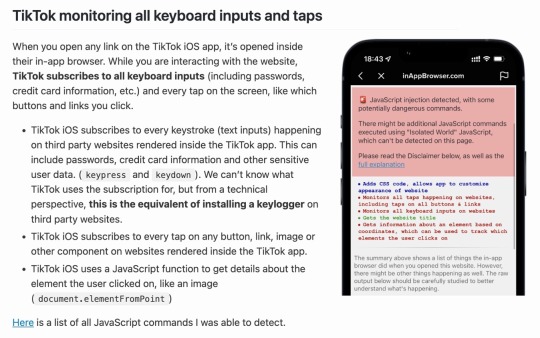#surveillance capitalism
Text
it's so funny to think abt how the dystopian levels of surveillance and data collection we are subjected to every day without consent, and sometimes without awareness being done primarily for the purpose of advertising goods and services to people. targeted ads that so often get blocked and ignored because everyone hates ads.
just... the hilarity of a vast network of machines dedicated to spying on everyone in the world, straight out of the mind of a deranged conspiracy theorist, which exists to let you know that shoes are 10% off at wal-mart, and which doesn't actually make you want to shop at wal-mart
#comedy#humor#data brokers#surveillance capitalism#anti-capitalist#anti consumerism#politics#social commentary#scout's brain
941 notes
·
View notes
Text
I feel like a lot of left-wing commentators are way too willing to take at face value claims made by Google and Facebook and the like about the power of their algorithms to predict and manipulate the behaviour of their userbase.
Like, okay, back in 2012, Facebook published a study on an experiment that they nonconsensually conducted on 12 million of their users to see how they reacted to subtle changes in how the algorithm conveyed politics to them; it showed a statistically significant effect.
Okay; right now you should be asking: why did Facebook publish this study? The answer is: because they wanted to sell advertisers on their platform; they wanted to make advertisers believe that they had an omniscient tool of public manipulation. This of course should raise a few more questions, like:
How many similar studies did Facebook conduct that didn't yield a statistically significant result?
Would Facebook have published these studies, given that their aim was to sell advertisers on their platform?
How would you go about reproducing the results of this study if you, personally, do not own a massive social media platform?
Given that Facebook has evinced an absolute willingness to lie through its teeth about just about everything else in order to make a quick buck, what are the odds that their data is on the level?
How would you check, given that their data is proprietary?
And perhaps most importantly,
If Facebook was so goddamn omnipotent at manipulating public opinion in 2012, why does everyone hate them and think their platform is shit now?
Like, don't get me wrong. It's bad that these megacorporations control the dominant public forum of the 21st century. But let's not humour their claims to omnipotence.
#science and technology studies#I was just reading Shoshana Zuboff and this stood out to me#surveillance capitalism
121 notes
·
View notes
Text
Windows isn’t freeware, it requires a license that almost every consumer ultimately pays for. That could be in the form of the price of a laptop that has a Windows OEM license baked in, or a product key if you built your own PC. Microsoft should respect the fact that people already pay for Windows and don’t want ads shoved down their throats. Windows is an important productivity tool for many people, and shouldn’t be treated like a cheap streaming box loaded with ads.
#enshittification#I paid for a licence#surveillance capitalism#you are being watched#this is so exhausting#OS#windows 11
215 notes
·
View notes
Text
"The words we shared built chat GPT, the images we shared built Stable Diffusion. Generative AI is just another word for surveillance capitalism. Taking our data with dubious consent and activating it through services it sells back to us. It is a visualisation of the way we organise things, a pretty picture version of the technologies that sorted and categorised us all along.
Instead of social media feeds or bank loans or police lineups, these algorithms manifest as uncanny images, disorienting mirrors of the world rendered by a machine that has no experience of that world. If these images are unsettling because they resemble nothing like the lives they claim to represent, it's because that is precisely what automated surveillance was always doing to us."
Eryk Salvaggio, The Age of Noise, 2024
93 notes
·
View notes
Text

684 notes
·
View notes
Text
more tumblr bs…
tumblr will be jumping on the AI train to steal everyone's blog content
^paid link & archive ch seems to be down :[
from yahoo to verizon & autommatic, the queer community has been targeted for 'policy violations' …it's exhausting.
& as i loathe AI & art theft, i don't think i'll have commiepinkofag.org hosted at tumblr much longer. i will go back to hosting it old-school elsewhere… where? idk rn
once/if my life is a bit more stable & i figure out next-steps, i will post more details.
if you are on wordpress.com, the same AI scrape policy applies.
if you run wordpress on another platform, or self-host & you don't want your posts, OC, images etc used by these corporate scum… you should remove their JetPack plugin especially, and any other plugin created by autommatic
i know quite a few have jumped ship already [from mr vindictive transphobe] but if you are thinking of moving to the fediverse, i'd recommend staying off billionaire-owned bluesky.
be aware some instances may join the facebook/threads activity hub… and data will more than likely be scraped from those servers as well…
that said…
there are a ton of trans & queer mastodon sites to join
i'm on mastodon.art if you wanna say hi…
#corporate hellscape#commiepinkofag#copyright#privacy#commie pinko fag#surveillance capitalism#queer history#queer#lgbqti#lgbtq#lgbt#trans#mass exodus#artificial intelligence#ai#commiepinkofag.org
9 notes
·
View notes
Link
One of Asher’s innovations — or more precisely one of his companies’ innovations — was what is now known as the LexID. My LexID, I learned, is 000874529875. This unique string of digits is a kind of shadow Social Security number, one of many such “persistent identifiers,” as they are called, that have been issued not by the government but by data companies like Acxiom, Oracle, Thomson Reuters, TransUnion — or, in this case, LexisNexis.
[...]
It took a certain kind of mind to envision the systems Asher now wanted to build, but it also took a certain mentality. What would separate his databases from most of their contemporaries would be not just the records they held or the technology they employed but their focus on what is today blandly known in the industry as “risk.” They would be designed to manage risk for insurers, and eventually for society writ large, by uncovering what a person might intentionally or unintentionally be hiding: an asset, an associate, an address, a conspiracy, a conviction and so on.
Such risk analytics are predicated on mistrust, so it was no surprise that Asher, with his own big secret to hide and difficulty trusting anyone, would become a pioneer in the space. Contrast his creations with, say, a marketing database from the same era, focused on what brand of shampoo or model of car a person has bought in the past or might be swayed to buy in the future, and the questions asked and answered were very different. Instead of asking, “What will this person like, and what will he buy?” it asked, “What isn’t he telling us, and what will he do wrong?” Asher, in taking on LeGette’s database project, had started encoding a certain paranoia — his own — into American life.
23 notes
·
View notes
Text

Did you know that all companies behind the above mentioned services are part of the so-called Surveillance Capitalism? In a nutshell, this term describes an economic system centered around technology monopolies which harvest private user data to maximize profit.
Don't see any issues with that? Well, Surveillance Capitalism actually threatens the very core of our societies. It gives rise to mass surveillance, polarizes the political debate, interferes with electoral processes, drives uniformity of thought, facilitates censorship and promotes planned obsolescence. Tackling those issues requires comprehensive changes to our legal systems and social conventions.
70 notes
·
View notes
Text
So I recently enabled the DuckDuckGo Android browser "app tracking protection" and it is enlightening. I know protection software stats can be a bit self-serving but
23,000+ blocked tracking attempts blocked today.
Apps attempting to track me when they're not running. They're not even running in the background.
All apps that track are using multiple agencies, eg Tumblr (not the worst but not good) has trackers from Google, Amazon, The Trade Desk, Adjust, Integral Ad Science, comScore, Double Verify, Liftoff, Smaato, RhythmOne and AcuituAds running.
Mostly ad-targeting but all of them are trying to get enough information to discern exactly who I am and where I am at all times
Fuck sake. No wonder the term Spyware has become outmoded.
27 notes
·
View notes
Text
what's actually wrong with 'AI'
it's become impossible to ignore the discourse around so-called 'AI'. but while the bulk of the discourse is saturated with nonsense such as, i wanted to pool some resources to get a good sense of what this technology actually is, its limitations and its broad consequences.
what is 'AI'
the best essay to learn about what i mentioned above is On the Dangers of Stochastic Parrots: Can Language Models Be Too Big? this essay cost two of its collaborators to be fired from Google. it frames what large-language models are, what they can and cannot do and the actual risks they entail: not some 'super-intelligence' that we keep hearing about but concrete dangers: from climate, the quality of the training data and biases - both from the training data and from us, the users.
The problem with artificial intelligence? It’s neither artificial nor intelligent
How the machine ‘thinks’: Understanding opacity in machine learning algorithms
The Values Encoded in Machine Learning Research
Troubling Trends in Machine Learning Scholarship: Some ML papers suffer from flaws that could mislead the public and stymie future research
AI Now Institute 2023 Landscape report (discussions of the power imbalance in Big Tech)
ChatGPT Is a Blurry JPEG of the Web
Can we truly benefit from AI?
Inside the secret list of websites that make AI like ChatGPT sound smart
The Steep Cost of Capture
labor
'AI' champions the facade of non-human involvement. but the truth is that this is a myth that serves employers by underpaying the hidden workers, denying them labor rights and social benefits - as well as hyping-up their product. the effects on workers are not only economic but detrimental to their health - both mental and physical.
OpenAI Used Kenyan Workers on Less Than $2 Per Hour to Make ChatGPT Less Toxic
also from the Times: Inside Facebook's African Sweatshop
The platform as factory: Crowdwork and the hidden labour behind artificial intelligence
The humans behind Mechanical Turk’s artificial intelligence
The rise of 'pseudo-AI': how tech firms quietly use humans to do bots' work
The real aim of big tech's layoffs: bringing workers to heel
The Exploited Labor Behind Artificial Intelligence
workers surveillance
5 ways Amazon monitors its employees, from AI cameras to hiring a spy agency
Computer monitoring software is helping companies spy on their employees to measure their productivity – often without their consent
theft of art and content
Artists say AI image generators are copying their style to make thousands of new images — and it's completely out of their control (what gives me most hope about regulators dealing with theft is Getty images' lawsuit - unfortunately individuals simply don't have the same power as the corporation)
Copyright won't solve creators' Generative AI problem
The real aim of big tech's layoffs: bringing workers to heel
The Exploited Labor Behind Artificial Intelligence
AI is already taking video game illustrators’ jobs in China
Microsoft lays off team that taught employees how to make AI tools responsibly/As the company accelerates its push into AI products, the ethics and society team is gone
150 African Workers for ChatGPT, TikTok and Facebook Vote to Unionize at Landmark Nairobi Meeting
Inside the AI Factory: the Humans that Make Tech Seem Human
Refugees help power machine learning advances at Microsoft, Facebook, and Amazon
Amazon’s AI Cameras Are Punishing Drivers for Mistakes They Didn’t Make
China’s AI boom depends on an army of exploited student interns
political, social, ethical consequences
Afraid of AI? The startups selling it want you to be
An Indigenous Perspective on Generative AI
“Computers enable fantasies” – On the continued relevance of Weizenbaum’s warnings
‘Utopia for Whom?’: Timnit Gebru on the dangers of Artificial General Intelligence
Machine Bias
HUMAN_FALLBACK
AI Ethics Are in Danger. Funding Independent Research Could Help
AI Is Tearing Wikipedia Apart
AI machines aren’t ‘hallucinating’. But their makers are
The Great A.I. Hallucination (podcast)
“Sorry in Advance!” Rapid Rush to Deploy Generative A.I. Risks a Wide Array of Automated Harms
The promise and peril of generative AI
ChatGPT Users Report Being Able to See Random People's Chat Histories
Benedetta Brevini on the AI sublime bubble – and how to pop it
Eating Disorder Helpline Disables Chatbot for 'Harmful' Responses After Firing Human Staff
AI moderation is no match for hate speech in Ethiopian languages
Amazon, Google, Microsoft, and other tech companies are in a 'frenzy' to help ICE build its own data-mining tool for targeting unauthorized workers
Crime Prediction Software Promised to Be Free of Biases. New Data Shows It Perpetuates Them
The EU AI Act is full of Significance for Insurers
Proxy Discrimination in the Age of Artificial Intelligence and Big Data
Welfare surveillance system violates human rights, Dutch court rules
Federal use of A.I. in visa applications could breach human rights, report says
Open (For Business): Big Tech, Concentrated Power, and the Political Economy of Open AI
Generative AI Is Making Companies Even More Thirsty for Your Data
environment
The Generative AI Race Has a Dirty Secret
Black boxes, not green: Mythologizing artificial intelligence and omitting the environment
Energy and Policy Considerations for Deep Learning in NLP
AINOW: Climate Justice & Labor Rights
militarism
The Growing Global Spyware Industry Must Be Reined In
AI: the key battleground for Cold War 2.0?
‘Machines set loose to slaughter’: the dangerous rise of military AI
AI: The New Frontier of the EU's Border Extranalisation Strategy
The A.I. Surveillance Tool DHS Uses to Detect ‘Sentiment and Emotion’
organizations
AI now
DAIR
podcast episodes
Pretty Heady Stuff: Dru Oja Jay & James Steinhoff guide us through the hype & hysteria around AI
Tech Won't Save Us: Why We Must Resist AI w/ Dan McQuillan, Why AI is a Threat to Artists w/ Molly Crabapple, ChatGPT is Not Intelligent w/ Emily M. Bender
SRSLY WRONG: Artificial Intelligence part 1, part 2
The Dig: AI Hype Machine w/ Meredith Whittaker, Ed Ongweso, and Sarah West
This Machine Kills: The Triforce of Corporate Power in AI w/ ft. Sarah Myers West
#masterpost#reading list#ai#artificial art#artificial intelligence#technology#big tech#surveillance capitalism#data capital#openai#chatgpt#machine learning#r/#readings#resources#ref#AI now#LLMs#chatbots#data mining#labor#p/#generative ai#research#capitalism
34 notes
·
View notes
Text

#relevant#late stage capitalism#stereo#speakers#hi fi stereo#capitalism#police state#fuck amazon#fuck bezos#take time to unplug#unplug#surveillance#surveillance capitalism
87 notes
·
View notes
Text
On the strength of its lavish recruitment efforts, Google tripled its number of machine intelligence scientists in just the last few years and has become the top contributor to the most prestigious scientific journals—four to five times the world average in 2016. Under the regime of surveillance capitalism, the corporation’s scientists are not recruited to solve world hunger or eliminate carbon-based fuels. Instead, their genius is meant to storm the gates of human experience, transforming it into data and translating it into a new market colossus that creates wealth by predicting, influencing, and controlling human behaviour.
[...] We have come to take for granted that the internet enables an unparalleled diffusion of information, promising more knowledge for more people: a mighty democratizing force that exponentially realizes Gutenberg’s revolution in the lives of billions of individuals. But this grand achievement has blinded us to a different historical development, one that moves out of range and out of sight, designed to exclude, confuse, and obscure. In this hidden movement the competitive struggle over surveillance revenues reverts to the pre-Gutenberg order as the division of learning in society shades toward the pathological, captured by a narrow priesthood of privately employed computational specialists, their privately owned machines, and the economic interests for whose sake they learn.
Shoshana Zuboff, The Age of Surveillance Capitalism: The Fight For a Human Future at the New Frontier of Power
39 notes
·
View notes
Text


exactly
#i 100% edited this#but ‘smart’ toys are mostly for the recycling bin#smart device#internet of things#surveillance capitalism#mine
44 notes
·
View notes
Text
“For example, in addition to easily recognizable company names, more than 7,000 companies in Consumer Reports’ study were named using unreadable gibberish, or just numbers that don’t mean anything to most users."
3 notes
·
View notes
Text
Fight Club in the Age of Big Tech
Fight Club, written by Chuck Palahniuk, follows an unnamed protagonist who, disillusioned and suffering from insomnia, attends multiple support groups for people with various afflictions. On a business trip he meets Tyler Durden, and together they form Fight Club, which expands and evolves into Project Mayhem, a terrorist organisation based on anarchy and anti-consumerism.
Today, despite the backlash against globalisation and the waning of American power, consumerism still abounds, especially in the digital world. This in China as well as the West — Amazon and Alibaba are two of the largest retail companies in the world, both imperial in their scope and reach. And it is not hard to see echoes of the protagonist’s experience here — our online shopping experiences have removed us from the high street, where we otherwise might have met friends and gone out for coffee; targeted advertising and surveillance capitalism has eroded our privacy and allowed faceless corporations into our homes; and the supremacy of huge corporations has reduced our consumer choices, giving us the illusion of choice (how many times do you go on Amazon looking for a product, and see numerous listings of essentially identical products?).
Big Tech would position itself as the disrupter, upending our previous way of life to liberate us, connect us, and give us greater freedom. Social media was supposed to help oppressed peoples defeat autocracy. But what if Big Tech is now the face of faceless consumer culture? What if that is what we should be liberating ourselves from? In Fight Club, the goal of Project Mayhem was to erase human history so that we could start afresh; the new society would be primal, free of societal controls. What would that mean today? Destroying and erasing the Internet?
And yet it is in the digital world that people find their communities. Fight Club is a novel about the search for identity, finding escape and meaning when we’re alienated in the real world. In the digital space, people can find others like themselves and form bonds. For the most part this is innocuous, enriching, liberating; it can also mean that, like in the novel, people retreat into echo chambers and fall down a pathway to extremism. Like in Fight Club, it can lead people to do things they never thought they were capable of.
Towards the end of the novel, we find out that Tyler Durden was a projection of the protagonist’s self-conscious. In his desperation and disillusionment, the protagonist creates this idealised version of what, on some level, he wants to be. Might we, in creating online personas for the digital space, be experiencing something similar?
#reading#writers#book recommendations#book review#bookish#booklover#booklr#books#ChatGPT#Fight Club#Chuck Palahniuk#consumerism#globalization#digital world#Big Tech#surveillance capitalism#privacy#social media
2 notes
·
View notes